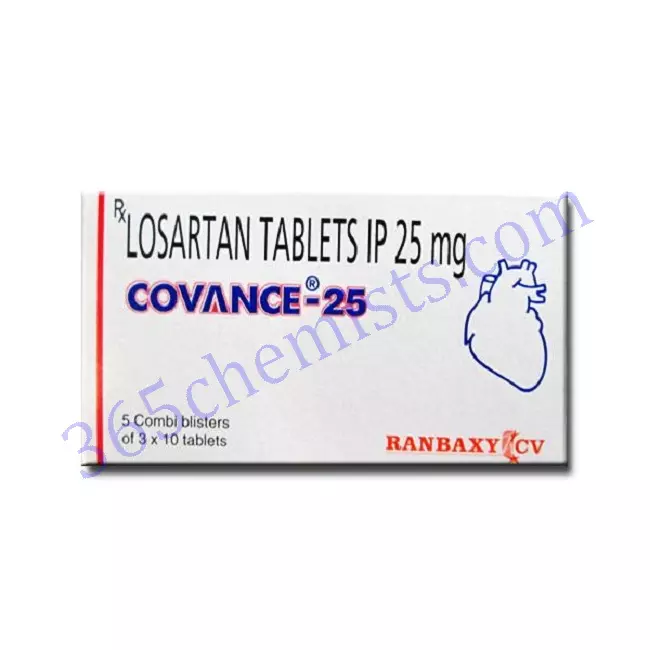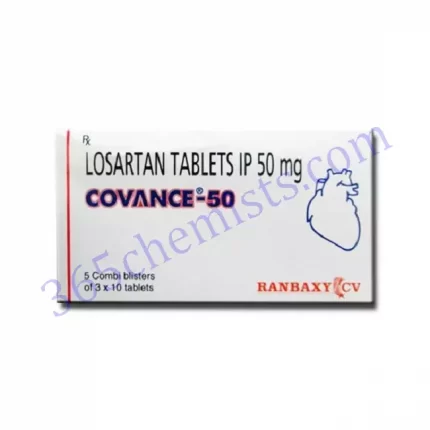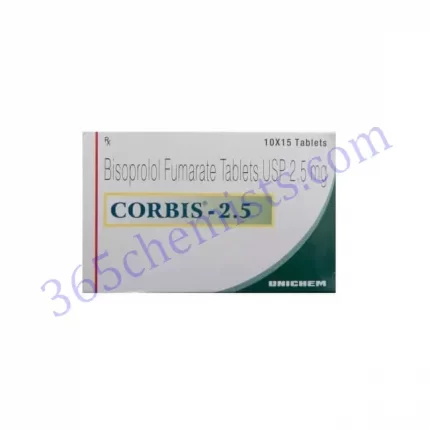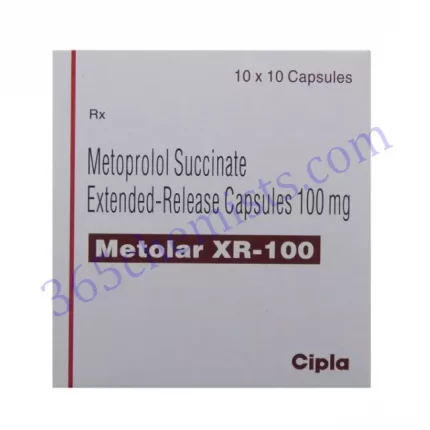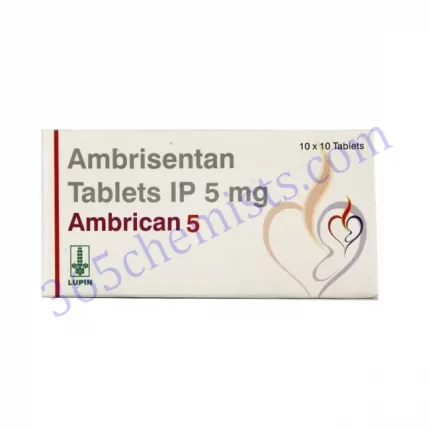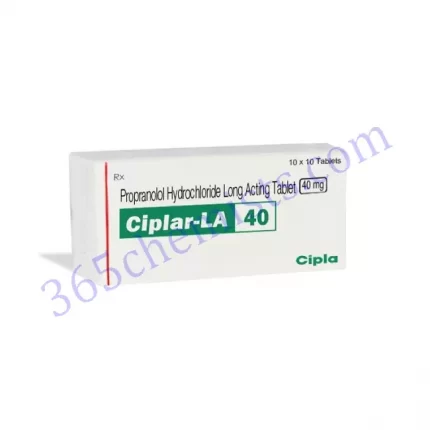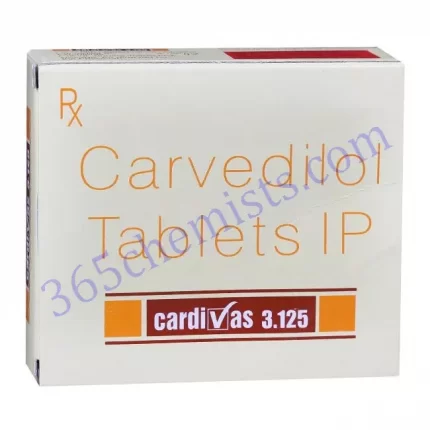Covance 25 Tablet: Managing Hypertension with Losartan 25mg
Losartan 25mg is contained in each Covance 25 Tablet, which is available only with a doctor’s prescription. Its primary application is in the management of hypertension, which refers to the common ailment characterised by an elevated blood pressure. Angiotensin receptor blockers, of which losartan is a member, are a group of drugs to which losartan belongs. It accomplishes this by inhibiting the action of a hormone known as angiotensin II, which is responsible for the narrowing of blood vessels and the elevation of blood pressure. Covance 25 Tablet works to lower blood pressure by preventing the effects of angiotensin II. This results in the blood vessels being able to relax and expand, which in turn reduces the amount of resistance they experience.
Managing Hypertension with Losartan:
Covance 25 Tablet, which contains the main component losartan, is a highly successful drug for the management of hypertension. This helps minimise the risk of related consequences such as heart disease, stroke, and renal difficulties by reducing blood pressure. Covance 25 Tablet offers continuous control of blood pressure throughout the day, making it possible for individuals to reach and keep the blood pressure values they have set for themselves. It is frequently administered as a component of an all-encompassing treatment strategy that also incorporates alterations to the patient’s way of life and, if necessary, additional hypertensive drugs.
Clinical Studies:
The effectiveness of Losartan as a treatment for hypertension has been shown by a significant number of clinical investigations. According to the findings of these trials, Losartan is an excellent medication for lowering blood pressure and protecting the cardiovascular system. In terms of its effectiveness, it has been demonstrated to be on par with that of other antihypertensive medication classes as well as other ARBs. Losartan has also been linked to benefits in cardiovascular outcomes, such as a lower risk of heart attack and stroke. This association was made after the drug was studied for its effects on the cardiovascular system.
Related Product
Covance 25 Tablet
Covance 50 Tablet
Covance AT Tablet
Covance D Tablet
Safety Profile:
When taken exactly as directed, Covance 25 Tablet has a safety profile that is, on the whole, rather positive. Some of the most common adverse effects include lightheadedness, headaches, and weariness. Serious adverse effects are uncommon but may manifest themselves as allergic responses, low blood pressure, or difficulties with the kidneys. Before beginning treatment with Covance 25 Tablet, it is critical to have a medical evaluation from a trained practitioner and disclose any preexisting medical problems or medications that you are currently taking.
Dosage and Administration:
The Covance 25 Tablet should be taken orally once daily, either with food or not, in accordance with the instructions provided by your healthcare professional. It is possible for the dosage to change depending on the characteristics of the individual patient as well as the degree of hypertension. It is critical to adhere to the treatment plan that has been given for you and to discuss any issues or questions regarding your dosage with your healthcare professional. During treatment with Covance 25 Tablet, it is essential to have routine checks on both the patient’s blood pressure and any potential adverse effects.
Precautions and Contraindications:
Patients who suffer from specific medical disorders, such as kidney illness, liver disease, heart failure, or electrolyte imbalances, are to exercise extreme caution when taking the Covance 25 Tablet. Before beginning therapy, it is imperative that you discuss with your healthcare practitioner any pre-existing medical problems, drugs, or allergies you may have. Patients who have a history of angioedema (swelling of the face, lips, tongue, or neck) connected to previous use of ARBs should not take Covance 25 Tablet since it is not safe for them to do so. Patients who are hypersensitive to losartan should also avoid taking the medication.
Possible Side Effects:
Although the Covance 25 Tablet is generally well accepted, it is possible that it could have adverse effects in certain people. Dizziness, headaches, signs of gastrointestinal distress, and weariness are examples of common adverse reactions that may occur. In most cases, these adverse effects are not severe and only last for a short period of time before disappearing on their own. However, it is imperative that you get in touch with your healthcare practitioner for additional examination if you encounter any side effects that are severe or continue for an extended period of time.
Drug Interactions:
There is a possibility of a pharmacological interaction between Covance 25 Tablet and a number of other medications, including but not limited to other antihypertensive drugs, diuretics, nonsteroidal anti-inflammatory drugs (NSAIDs), and potassium supplements. Because of these interactions, the drug may not work as well or the patient may be more likely to experience unwanted side effects. It is of the utmost importance that you inform your healthcare practitioner about all of the drugs, vitamins, and herbal items that you are currently using in order to prevent any potential interactions.
Conclusion:
An efficient medication for the management of hypertension is the Covance 25 Tablet, which has a dosage of 25 milligrammes of the drug losartan. It accomplishes this by inhibiting the activity of angiotensin II, which in turn helps to relax and dilate the blood vessels, which in turn results in a reduction in blood pressure. However, taking medicine regularly is not enough to control hypertension on its own. Modifications to one’s way of life, such as adhering to a balanced diet, engaging in regular physical activity, learning how to better manage stress, and staying away from both tobacco and excessive alcohol intake, are very necessary in order to achieve ideal blood pressure control. It is important to discuss the use of Covance 25 Tablet as well as the use of any other hypertension treatment with your primary care physician or other qualified healthcare professional. You can effectively manage your blood pressure and promote overall cardiovascular well-being by receiving the appropriate therapy and making changes to the way you live your life.

